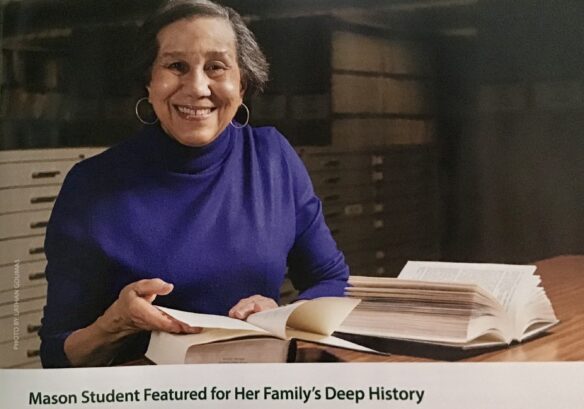Three random things occurred this week that reminded me of how history can be obscured.

We Have to Dig
Reading my Alumni magazine, “Mason Spirit”, I was delighted to read the story of Bobbi Bowman and her discovery of her ancestor’s struggle.[ref]Clark, Mary Lee, “Mason Student Featured for Her Family’s Deep History”, Mason Spirit, Summer 2020, p. 5.[/ref]
In antebellum Virginia, it was legal to buy oneself out of slavery, so long as one left the state once becoming emancipated. For fifteen years William Williamson fought for the right to remain on his farm in Virginia, to remain with his wife and children, who were owned by a man on a nearby farm. When Williamson failed, he sold himself and his farm to Thomas Rosser, a master he had chosen. This was in 1857.
Williamson died a little more than two decades later. By that time he and his family had become free because of the 1863 abolition of slavery throughout the United States. But Rosser still owned the farm the family lived on.
But Williamson’s faith in Thomas Rosser was not ill-placed. With Williamson dead, Rosser could have sold the farm to anyone. Instead, Rosser deeded the farm over to Williamson’s widow. But this epic struggle and Rosser’s integrity had been lost to time, until Bobbi Bowman happened to look through the deed records for ancestral names at the Campbell County courthouse. Ms. Bowman’s willingness to dig has blessed both her family and the family of Thomas Rosser.
Records can be Wrong
This month my mother died. The day after her passing, my sister, Lucinda, and I went to the mortuary to finalize burial arrangements and give information for the death certificate. Along the way, we indicated that another sister, Tricia, had been identified as the prospective personal representative (executor). Since the executor would need the copies of the death certifcate, we provided Tricia’s mailing address for copies.
When we got the death certificate, we saw that it lists Tricia as the informant. She wasn’t. But it caused me to reflect on the various documents I’ve looked at in my own search of history. How often was a wrong thing documented? Each error could have seemed innocent or insignificant at the time, but the accumulation of errors can sometimes lead us to entirely wrong reconstructions of history.
Fiction (Often) Takes Liberties
We have watched quite a few movies of late. In some of the fictional worlds, the entire world is created. This is the case in shows like the Star Wars universe or the Middle Earth universe, where there is nothing that indicates those universes have any connection with the real world.
Other fiction is built on the real world. The Twilight saga takes place in a contemporary version of the real world where there just happen to be vampires and individuals who can transform themselves into wolves (and where there are also separately werewolves). The Divergent trilogy takes place in a post-apocalyptic version of our world. The Hunger Games movies similarly take place in a post-apocalyptic version of our world. Grand dramatic arcs can be constructed in these variants of the real world, as many of the dramatic elements are contingent on the fantastical elements of the world the author has created.
Then there is fiction that we are told is a valid story in our world. This is where I struggle the most. Each creator in this space is trying to create a space where the viewer can escape and enjoy a rollercoaster of emotion while safely ensconced in a seat or couch.
Troop Zero is one such recent offering, touted as heart-warming. The dramatic arc of the story is quite satisfying. But in order to achieve this arc, the story significantly mis-represents history.
Take Away
I would that we would recognize that historical documents sometimes contain error. However deeply moving stories can be found by a bit of digging. If we fill our minds with popular entertainment, we risk yearning for imaginary worlds and even becoming grossly misinformed about the actual world in which we live.